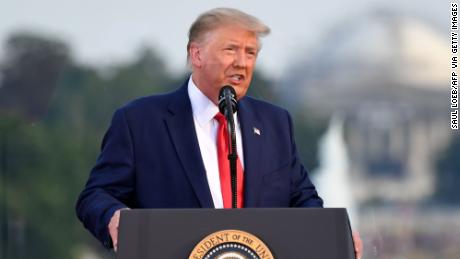Washington (CNN)In a move that could pit the Joint Chiefs of Staff and senior military leaders against President Donald Trump, a draft Pentagon policy document to ban the Confederate flag from being displayed at military bases has been circulating for the last week at the highest levels of the military, a defense official directly familiar with the document told CNN.
It has yet to be formally approved while military legal personnel review how to ensure a ban can properly be carried out, the official said.
A decision to move ahead with a department-wide ban could now come soon, the official said. It is not known if Defense Secretary Mark Esper will seek Trump's approval to proceed with the ban.
Word of the potential military ban came the same day the White House press secretary Kayleigh McEnany avoided specifically answering multiple questions from reporters about the President's apparent support for flying the flag at NASCAR events.
She said the President was not "making a judgment call" about the flag in a tweet where he suggested that NASCAR ratings were down because of the decision to ban the flag.
Trump has defended Confederate symbols
It also comes as Trump has continued to publicly defend preserving Confederate statues and adamantly opposed renaming military bases after Confederate leaders despite Pentagon support for doing so.
Marine Corps Commandant General David Berger and the head of US forces in Korea, Gen. Robert Abrams, have already instituted bans on displays of the flag at Marine bases and in South Korea. The Navy, Army and Air Force military chiefs and their civilian counterparts have all been working on similar bans.
The Chief of Naval Operations, Adm. Mike Gilday, last month directed his staff to begin crafting an order that would ban the flag from all public spaces and work areas aboard Navy installations, ships, aircraft and submarines, according to a Navy official. Army and Air Force bans had been ready to go with similar bans as well, according to multiple officials.
Military leaders in favor of banning the flag have argued that it is a divisive symbol that adversely impacts the cohesion of fighting units.
"I am mindful that many people believe that flag to be a symbol of heritage or regional pride. But I am also mindful of the feelings of pain and rejection of those who inherited the cultural memory and present effects of the scourge of slavery in our country," Berger wrote back in April. "My intent is not to judge the specific meaning anyone ascribes to that symbol or declare someone's personally held view to be incorrect."
"Rather, I am focused solely on building a uniquely capable warfighting team whose members come from all walks of life and must learn to operate side-by-side," he added.
Abrams, the commander of all US forces in Korea echoed that point in a June memo when he banned the flag.
"While I acknowledge that some might view it as a symbol of regional pride, many others in our force see it as a painful reminder of hate, bigotry, treason and devaluation of humanity. Regardless of perspective, one thing is clear; it has the power to inflame feelings of racial division. We cannot have that division among us," he wrote.
Still, Trump has made his views on issues related to Confederate statues and the renaming of military bases clear, making the banning of the flag another potential point of conflict between the Pentagon and the President.
Last week Trump issued a veto threat yet on a crucial defense spending bill if lawmakers didn't strip language requiring bases named after Confederate leaders be renamed.
On Sunday, Sen. Jack Reed, the top Democrat on the Senate Armed Services Committee, told CNN that the removal of Confederate names was a "bipartisan" position.
"We have a bipartisan position. And it passed the Senate Armed Services committee on a bipartisan basis. It came to the floor. It is part of our bill. I assume it will be part of the House bill. And I think we will go ahead and pass the legislation. Again, I can't emphasize enough, it was bipartisan. It came out because I think people do recognize that we had an important moment in which to put history right, if you will," Reed said.
Military leaders have struck a different tone than Trump
Military leaders have struck a starkly different tone on the issues of race and inclusiveness in recent weeks.
Last month America's most senior general warned that "divisiveness leads to defeat" in a speech to Naval War College graduates.
Chairman of the Joint Chiefs of Staff Mark Milley counseled the audience to "eliminate anything that divides us."
While he also spoke of the traditional need to keep an eye on adversaries "during periods when we are weary from conflict or otherwise preoccupied," and did not mention Trump by name, his comments appeared to address the broader backdrop of racial divisiveness in the country and concerns within the Pentagon about the military becoming politicized.
Milley told the students, "We who wear the cloth of our nation must hold dear the principle of an apolitical military that is so deeply rooted in the very essence of our Republic."
His speech followed Defense Secretary Mark Esper's announcement of a major review aimed at improving diversity and "ensuring equal opportunity across all ranks" of the US military.
The Pentagon effort to address racism and promote equality, even as leaders try to avoid White House politics, has been notable and follows Milley's extraordinary apology for appearing in a photo-op with Trump after the forceful dispersal of peaceful protesters outside the White House last month.
Esper similarly acknowledged the problematic nature of his own appearance and later told reporters he did not want to see active duty forces on the streets of Washington -- a statement that increased tensions between the Pentagon and the White House.
Several current defense officials with access to both men say the two are deeply concerned about Trump attempting to politicize the military and potentially dragging the forces into the presidential election campaign.










